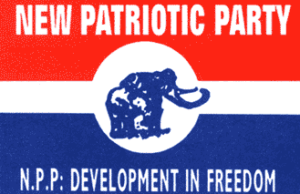Outcome of NPP elections: A paradigm shift to break the eight?
 The outcome of the New Patriotic Party’s (NPP) National Executive Elections, which was held at the Accra Sports Stadium over the weekend, has affirmed the call by delegates for a “new direction” to enable the party “break the eight.”
The outcome of the New Patriotic Party’s (NPP) National Executive Elections, which was held at the Accra Sports Stadium over the weekend, has affirmed the call by delegates for a “new direction” to enable the party “break the eight.”
For the majority of the more than 6,700 delegates who gathered at the Stadium, two key positions – National Chairman, and General Secretary – were the pivots of the Party, and thus, a change in leadership was critical, unifying and energising the Party at all levels ahead of the 2024 general election.
In an interaction with a number of delegates at the Conference before voting commenced, they expressed concern that the Party had “lost touch” with the grassroots and there was the need for a paradigm shift to reactivate the Party base.
Among the issues they raised were that the leadership of the Party “did not do enough” to resolve the challenges that characterised the NPP’s 2020 Parliamentary primaries, which they said contributed to the Party losing a lot of seats in the 2020 general election.
The wind of change was blowing within the Accra Sports Stadium before the contest.
Delegates, observers, and analysts, said they were not surprised when the incumbent General Secretary, John Boadu, lost to Justin Frimpong Kodua, a relatively new face.
In the case of Mr Stephen Ayesu Ntim, who was elected as National Chairman on his fifth attempt, some of the delegates said they admired his consistency with the Party and that they believed that he was the right man to lead the NPP at this point, describing him as a “grassroots person.”
“We need a chairman who will go to the ground and work and Mr Ntim has demonstrated that he is the man of the people,” Samuel Nkansah, a delegate, said after the contest.
Dr Charles Dwamena, Treasurer, and Salam Mohammed Mustapha, Youth Organiser, were also among the new faces to be elected as national executive members.
Kate Gyamfua, the National Women’s Organiser, and Abdul Aziz Haruna Futa, Nasara Coordinator, retained their seats.
Henry Nana Boakye, who was the National Youth Organiser in the last administration, elevated himself by clinching the National Organiser position.
The election was generally calm and peaceful. The aspirants complied with the Party’s directive against the mounting of billboards at the venue.
Voting however delayed for more than four hours as many delegates were not seated as late as 0900 hours when the Conference was supposed to have started. Voting started late, at about 1800 hours.
Mr Freddie Blay, the immediate-past Chairman, NPP, attributed the delay to what he described as challenges with accreditation for some of the delegates.
However, the 26 voting centres created by the Electoral Commission sped the process. Voting ended at about 22:50 hours.
Some 306 delegates made up of 291 TESCON delegates and 21 proxy voters were not allowed to cast their votes as a result of a court injunction.
The Party’s National Elections Committee said it had received the injunction Friday night, July 15, 2022 – a decision which did not go down well with some of the affected members.
In an interview with the Ghana News Agency, Dr Seidu Alidu, a Political Science Lecturer, Political Science Department of the University of Ghana, commended the Party for ensuring that the elections were peaceful as compared to what happened in the Polling Station and Constituency elections.
He said the late start of the Conference, the allegations of vote buying made by some of the candidates, and the open show of allegiance by some of the regional executive members were among the issues that took the shine off the Conference.
Dr Alidu said he was not surprised by the election of Mr Ntim as Chairman, emphasising that the new Chairman “has now understood the dynamics of the delegates.”
He said the ousting of John Boadu was also expected as events leading to the elections gave an indication that majority of the Party’s supporters were not happy with his leadership.
He said the election of Justin Frimpong Kodua affirmed that the delegates needed someone who could “inject freshness” into the Party.
“The calibre of persons elected is enough to break the eight. There is a good blend of old and new faces. There is also the regional balance,” he said.
Dr Alidu added: “But breaking the eight requires more than just electing executives. It requires a lot of collective efforts in terms of party strategy, building unity and all those things. It also has to do with building a very solid economy, and moving the country from the general hardships.”
Dr Alidu urged the new National Executive members to always apply the Party’s constitution without fear or favour to ensure transparency in its handling of issues as the Party commenced preparations towards electing its flagbearer for the 2024 presidential election.
“It doesn’t matter where they belong. What is important is making the Party’s constitution work. Bending the rules to favour a particular candidate is dangerous for the Party,” he said.
Next comes the election of the Party’s presidential candidate, the face of the party for the next election, which is around the corner. It will mark the beginning of the party’s final preparations for the 2004 election. Members stare at a conundrum which poor handling could dent their cohesion for a long time to come.
By Edward Acquah
Source: GNA
